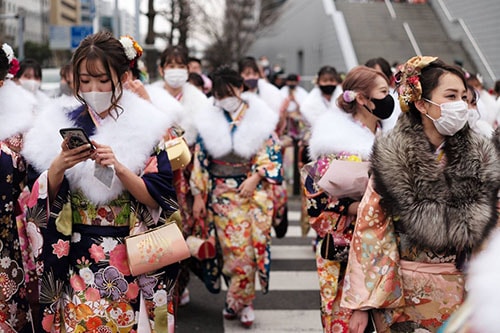The latest data shows that Japan has the highest rate of childless women in their 50s among developed countries.

The decision to remain childless is becoming increasingly popular among Japan's younger generation. Photo: Japan Times
In Japan, 27 percent of women born in 1970 had never given birth by the time they turned 50, according to the Organization for Economic Cooperation and Development (OECD). That is the highest proportion among 17 countries with comparable data, behind Finland at 20.7 percent.
Austria and Spain ranked third and fourth, respectively. The OECD data does not include Germany, but official statistics from that country show that 21% of women born in 1969 were childless.
Japan also once again leads in the rate of childless women, at 22.1 percent, when comparing data on women born in 1965 in 24 countries.
Western European countries have tried to stem the rise in childlessness by providing support for balancing work and family life, according to Nikkei Asia. According to some reports, the rate of childless women has fallen completely in the US and the UK.
But Japan remains an outlier, even among its younger generation, underscoring the challenges the country faces in averting a looming population crisis.
Reason
For Japanese women born in 2000, between 31.6% and 39.2% of this group are likely to remain childless during their lifetimes, according to estimates by the Tokyo-based National Institute of Population and Social Security Research (IPSS).
Rie Moriizumi, senior researcher at IPSS, found that women do not have children due to many factors, such as difficulty in getting married, not wanting children or delaying having children, infertility or health reasons.
These findings are based on survey responses collected by IPSS.
In recent years, the rate of Japanese women not having children due to difficulties in getting married has skyrocketed, becoming the top reason for women aged 25 to 49.
It seems that the big barrier to marriage in Japan is finding a suitable partner with adequate financial resources.
On the other hand, the increasingly popular trend of not getting married among young people is said to aggravate the aging population and low birth rate in the cherry blossom country.
Previously, a 2021 survey by the National Institute of Population and Social Security Research said that 17.3% of men and 14.6% of women aged 18-34 had no intention of getting married - the highest figure since the survey was first conducted in 1982.
At that time, only 2.3% of men and 4.1% of women said they would not marry, according to the Guardian.
Women who do not want to have children make up the second largest group. Moriizumi estimates that about 5% of women have made this choice, and that number is especially high among younger generations.
Unmarried women are more likely to decide not to have children if they have low incomes or have not found a partner.
“This suggests that more women have given up than actively chosen” not to have children, Moriizumi said.
Looking for solutions
Against that backdrop, Prime Minister Fumio Kishida's government plans to expand financial support for families with children.
Advocates have called for increased social benefits for part-time workers, along with labor reforms to help parents balance child-rearing with their work lives. Reducing education costs has also emerged as a pressing policy goal.
"The Japanese government has been working to increase the birth rate by trying to support people who want to get married or have children. But if the number of people who do not want to start a family continues to increase, the government will be forced to reconsider its policies," Shigeki Matsuda, a sociology professor at Chukyo University, told the Mainichi Shimbun.
The group born between 1965 and 1970, which is disproportionately childless, was the first generation to experience the impact of equal employment opportunity laws enacted in 1986.
Although more women are entering the workforce, the lack of measures to balance work and family has forced many to choose to leave work to raise families, or leave children behind to continue their careers. This has led to a decline in birth rates.
“As women stop prioritizing marriage and child-rearing in favor of their careers, marriage and childbearing are increasingly delayed. More and more people are becoming childless,” said Toshihiko Hara, an emeritus professor at Sapporo City University who has studied childlessness in Germany and Japan.
Some experts warn that the rise in childlessness could disrupt Japan's social structure.
Professor Aya Abe of Tokyo Metropolitan University conducted quantitative research to show that not having children often leads to a lack of social support networks.
Using data from the IPSS, Abe found that a large proportion of people who do not have children are lacking in daily support, such as having someone to help with small tasks or emotional support, such as someone to confide in.
Men, especially poor men, suffer more from the lack of such support.
“Research in Europe shows that people without children in family-oriented countries are more likely to become isolated,” she says.
According to Zing